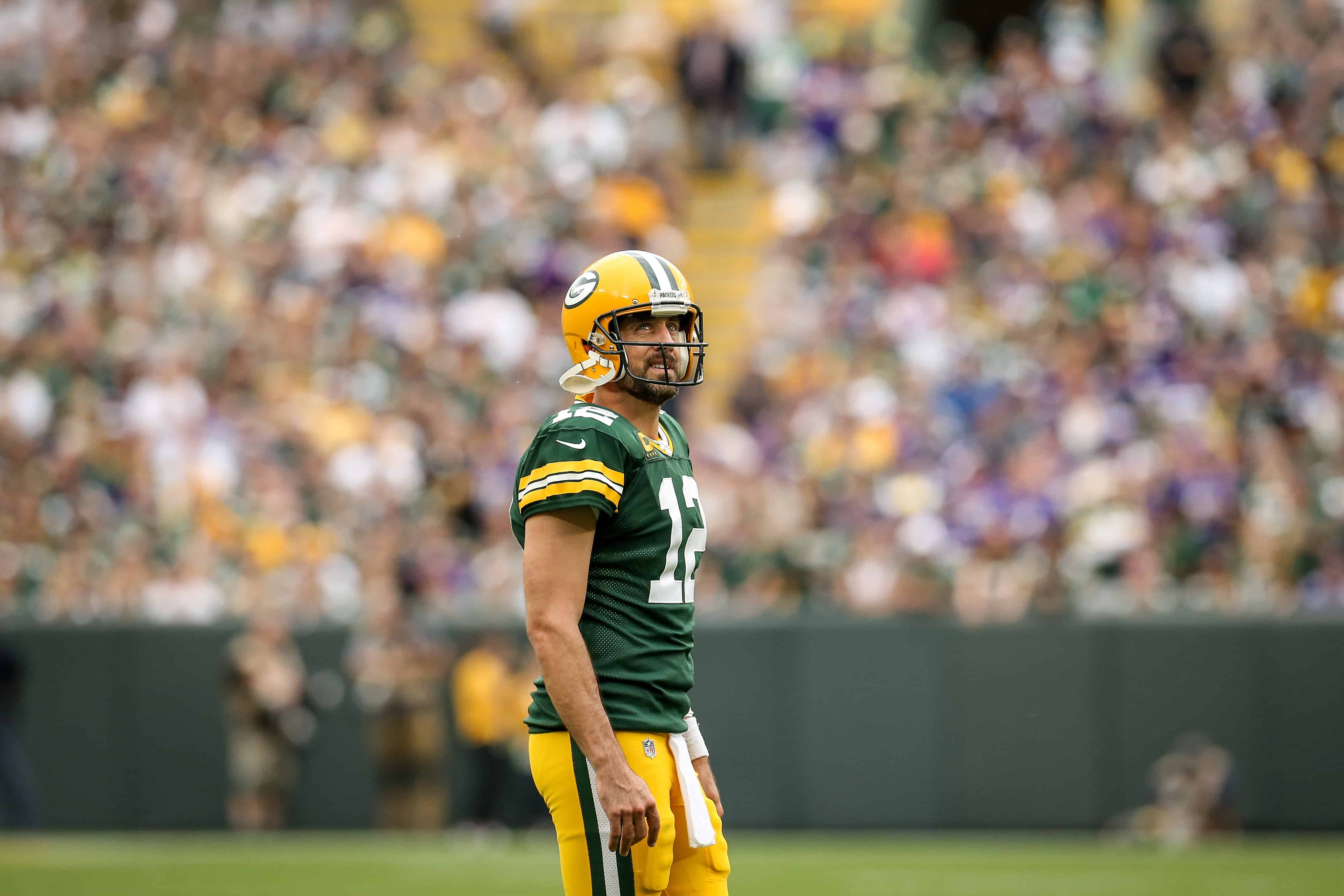Now that the first wave of free agency has passed and the NFL Draft has officially been put in the books, we have a near full layout of what NFL rosters are going to look like for the upcoming season. With that, we have a host of rookie content and freshly updated ranks for season-long and dynasty formats already up in our 2020 fantasy football content hub.
With the draft, a number of veteran players had their 2020 fantasy dynamics impacted for better or worse. Throughout the week, we are going to highlight some of the biggest winners and losers from the draft from each position. You can find quarterback winners here. And now for the losers…
Aaron Rodgers, Green Bay Packers
It is not a new take that you haven’t heard from the fallout of the draft over the past two days, but so many expected the Packers to improve Rodgers’s passing game surroundings instead of continuing to limit him.
Rodgers himself has no longer been the passer that is just elevating player solely on his own anymore and has not been that way since the 2014 season when he won the league’s MVP Award. Since that 2014 season, Rodgers ranks 27th in the league in yards per pass attempt (7.1 Y/A) for all passers that have thrown 300 or more passes over that span, right between Cam Newton and Teddy Bridgewater. He improves to 12th in adjusted yards per pass attempt since he does not throw many interceptions, but those marks were at 8.3 Y/A and 8.9 AY/A over the 2008-2014 seasons, which were the highest for all quarterbacks over that span.
In 2019, Rodgers dipped to QB14 in fantasy points per game (17.4) this past season with just six games higher than the QB19 in weekly scoring.
The Packers know what they have at the top in Davante Adams, but behind him is a different story. After Adams led the team with 83 receptions in just 12 games played, the next highest players on the roster in terms of receptions were Aaron Jones (49), Jamaal Williams (39), and Jimmy Graham (38). Over a four-game stretch with Adams absent in 2019, Jones led the team with 22 catches with the highest wide receiver (Lazard) checking in with 12 receptions during those games. The team went out and added Devin Funchess on a one-year deal, but for no tangible commitment.
Not only did Green Bay not draft a wide receiver, they also traded up into the first round for Rodgers’s backup and potential replacement in Jordan Love. General manager Brian Gutekunst also then told everyone publicly that they want to run the ball firsthand and have the passing game work off of that.
The subsequent moves made supported that sentiment as they drafted power back A.J. Dillon and H-Back Josiah Deguara on the second day of the draft followed by three interior offensive linemen on day three. After getting steamrolled for 285 rushing yards in the NFC Title Game, the Packers seem to be wanting to copy the San Francisco approach.
Jared Goff, Los Angeles Rams
There is a large gap from what the Packers did not do for Rodgers and the other passers here. The Rams did not have a first-round pick in this draft, but did have two second-rounders. With those second-rounders, they drafted two offensive players, but not ones to make Goff’s like a whole lot easier.
After significant offseason losses the previous offseason in 2019, the Rams offensive line took a major step backward a year ago. The team collectively ranked 22nd in ESPN’s pass blocking win rate and 19th in adjusted line yards created (4.27) per Football Outsiders. Their only offensive lineman to have a positive pass-blocking grade per Pro Football Focus was Andrew Whitworth, who will turn 39-years-old in December. This season, the Rams drafted just one offensive lineman and that came in the seventh round with their final draft pick.
Goff’s pressure rate went from 32.0% in 2018 (12th lowest) up to 36.0% in 2019 (18th). A passer that has always struggled with pressure, Goff has ranked 21st in yards per pass attempt in both 2018 (5.8 Y/A) and in 2019 (5.7 Y/A) while ranking posting a 59.8 rating under pressure in 2018 (22nd) and a 60.4 rating under pressure in 2019 (21st).
Tyrod Taylor, Los Angeles Chargers
The Chargers were expected to make a play for a quarterback early in the draft, but there was some holding out hope that the team may go after an offensive tackle to give Taylor more of a runway to hang onto his starting quarterback designation. Instead, the Chargers landed Justin Herbert at No. 6 overall.
The Chargers are going to say Taylor is their starting quarterback and that they will not play Herbert until it has a necessity, but we should anticipate that being sooner than later.
Since 2008, we have had 35 quarterbacks selected in the first round. 16 of them started immediately in Week 1. 24 of those players were starting for their organizations by Week 4 of the season. 26 of those players started more than half of the team games as a rookie. The only first-round rookie quarterback to actually not start a game in their rookie season out of those 35 players was Jake Locker in 2011.
Scaling that down to quarterbacks selected in the top-10, there are 23 passers in that same sample. Those 23 passers averaged 12.6 starts as rookies with 20 of the 23 players starting double-digit games. The three that did not were Locker (zero), Patrick Mahomes (one), and Jared Goff (seven starts). Taylor and the Chargers would have to significantly outperform expectations to keep Taylor as a full-season starter if he is under center Week 1.
















